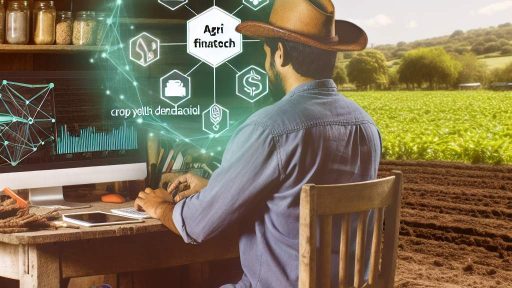Understanding Agri-Fintech Services
Definition of Agri-Fintech
Agri-Fintech refers to financial technology solutions tailored for agriculture.
It combines traditional agricultural practices with innovative financial services.
This blend enhances financial inclusion for farmers worldwide.
The goal is to improve productivity through technology-driven financial solutions.
Importance in Modern Agriculture
Agri-Fintech plays a crucial role in transforming agriculture.
It simplifies access to credit for smallholder farmers.
Farmers can obtain loans quickly and easily through digital platforms.
This access allows them to invest in better seeds, tools, and techniques.
Consequently, their yield potential increases significantly with proper funding.
Moreover, it aids farmers in managing risks associated with crop production.
For instance, insurance products protect against climate-related losses.
Furthermore, Agri-Fintech fosters data-driven decision-making in farming.
Farmers can analyze market trends and prices via mobile applications.
Such insights help them make informed choices, leading to better harvests.
In addition, Agri-Fintech promotes sustainability by funding eco-friendly practices.
Transform Your Agribusiness
Unlock your farm's potential with expert advice tailored to your needs. Get actionable steps that drive real results.
Get StartedInvesting in sustainable technologies ensures long-term agricultural viability.
Ultimately, Agri-Fintech is pivotal for a more resilient agricultural sector.
Overview of Sustainable Farming Practices
Definition and Importance
Sustainable farming refers to agricultural practices that promote environmental health.
It focuses on farming techniques that preserve resources and enhance ecosystem resilience.
This approach ensures food security while minimizing negative impacts on the environment.
Core Principles
First, sustainable farming emphasizes soil conservation and health.
Farmers use practices like crop rotation, cover cropping, and reduced tillage.
These techniques improve soil structure and fertility.
Additionally, sustainable farming promotes responsible water use.
For instance, methods such as drip irrigation and rainwater harvesting conserve water.
These practices reduce waste and protect local water resources.
Moreover, sustainable practices involve integrated pest management.
This method minimizes chemical inputs while controlling pests effectively.
It enhances biodiversity and decreases the risk of pest resistance.
Benefits of Sustainable Farming
Sustainable farming leads to healthier ecosystems and communities.
By reducing chemical runoff, it protects local wildlife and water quality.
Additionally, it fosters economic resilience for farmers.
Implementing sustainable practices can reduce costs and increase yields over time.
Furthermore, consumers benefit from better food quality and safety.
Products from sustainable farms often have higher nutritional values.
Lastly, sustainable farming practices contribute to climate change mitigation.
By sequestering carbon in the soil, it reduces greenhouse gas emissions.
This helps combat climate change and creates a healthier planet.
Key Agri-Fintech Services Available for Farmers
Access to Credit and Loans
Farmers benefit from tailored financial products in agri-fintech.
Showcase Your Farming Business
Publish your professional farming services profile on our blog for a one-time fee of $200 and reach a dedicated audience of farmers and agribusiness owners.
Publish Your ProfileThese products help them secure the capital they need for operations.
Microloans offer an accessible option for smallholder farmers.
Additionally, online platforms simplify the loan application process.
Furthermore, farmers can receive funds quickly, enabling timely investments.
Digital Payment Solutions
Agri-fintech facilitates seamless transactions through digital payment systems.
Farmers can manage their transactions with ease and security.
They can pay suppliers and receive payments from buyers instantly.
This reduces the reliance on cash and enhances financial transparency.
Insurance Products
Farmers can access various insurance products offered by agri-fintech companies.
These products protect crops and livestock from unexpected events.
Innovative crop insurance models use technology to assess risks.
This ensures coverage aligns closely with farmers’ specific needs.
Many platforms enhance accessibility to these vital insurance services.
Market Access and E-Commerce Platforms
Agri-fintech connects farmers directly to consumers through e-commerce platforms.
This allows farmers to expand their market reach significantly.
They can sell their produce without middlemen, increasing profit margins.
Moreover, these platforms provide valuable data to optimize pricing strategies.
Advisory Services and Data Analytics
Farmers receive expert guidance through advisory services integrated into agri-fintech platforms.
These services offer insights on best practices in sustainable farming.
Data analytics tools empower farmers to make informed decisions.
They can analyze weather patterns and soil health effectively.
Consequently, this leads to better resource management and productivity.
Gain More Insights: Harnessing Geothermal Energy for Farm Operations
How Agri-Fintech Solutions Enhance Access to Financing for Farmers
Bridging the Financing Gap
Agri-fintech solutions effectively bridge the gap between farmers and financial institutions.
These innovative platforms simplify the application process for loans and credit.
Farmers can easily access financial products tailored to their specific needs.
Moreover, they eliminate the lengthy paperwork traditionally required for loans.
Utilizing Data and Technology
Agri-fintech leverages data analytics to assess the creditworthiness of farmers.
These tools provide real-time insights into a farmer’s operational performance.
As a result, lenders can offer timely financial support based on accurate data.
Consequently, farmers are more likely to receive funding without traditional barriers.
Expanding Payment Options
Another advantage of agri-fintech is the diversification of payment options.
Farmers can choose from various payment methods, including digital wallets and mobile payments.
This flexibility ensures ease of transactions and fosters financial inclusivity.
Subsequently, it streamlines the purchase of seeds, equipment, and other essentials.
Creating Collaborative Networks
Agri-fintech promotes collaboration among farmers, lenders, and agribusinesses.
These networks foster knowledge-sharing and provide opportunities for joint ventures.
Farmers can gain insights from peers and industry experts regarding financing options.
This, in turn, helps them make informed decisions related to their agricultural practices.
Enhancing Financial Literacy
Agri-fintech initiatives often include financial literacy programs for farmers.
Showcase Your Farming Business
Publish your professional farming services profile on our blog for a one-time fee of $200 and reach a dedicated audience of farmers and agribusiness owners.
Publish Your ProfileThese programs educate farmers on budgeting, saving, and investing wisely.
As a result, farmers become empowered to manage their finances effectively.
Ultimately, this knowledge leads to better financial planning and sustainability.
Discover More: Agri-Fintech: Bridging The Gap Between Farmers And Financial Services
Impact of Technology in Improving Supply Chain Efficiency
Streamlining Operations
Technology enhances the efficiency of agricultural supply chains.
It automates many routine tasks, reducing human error.
Farmers can track their inventory in real-time.
Moreover, this visibility helps in making timely decisions.
Data-Driven Insights
Analytics technology provides valuable insights into market trends.
Farmers can adjust production based on demand forecasts.
This adaptability increases profitability and reduces waste.
Furthermore, predictive analytics can foresee potential disruptions.
Enhanced Communication
Technology facilitates better communication among supply chain partners.
Farm-to-table platforms connect producers directly with consumers.
This direct link reduces the number of intermediaries involved.
Consequently, this approach ensures fresher products for consumers.
Logistics and Transportation
Advanced logistics software optimizes transportation routes.
This optimization leads to reduced fuel consumption and costs.
Additionally, tracking shipments in real-time enhances transparency.
Farmers can ensure products reach markets at peak freshness.
Sustainability Practices
Technology supports sustainable practices within the supply chain.
For instance, precision farming reduces resource usage.
Smart irrigation systems minimize water wastage efficiently.
As a result, these practices contribute to environmental conservation.
Case Studies of Successful Implementation
Many farms have successfully adopted technology in their operations.
Green Valley Farms uses drones for crop monitoring.
This approach leads to timely interventions for pest control.
Similarly, Fresh Harvest employs blockchain for traceability.
This initiative bolsters consumer trust and satisfaction.
Uncover the Details: Smart Farming Tools Boosting Efficiency and Sustainability on Farms

Case Studies of Successful Agri-Fintech Implementations
Transforming Smallholder Farming in Kenya
A new Agri-Fintech platform emerged in Kenya.
It enabled smallholder farmers to access credit easily.
Farmers used their farm outputs as collateral.
This approach improved financial inclusion significantly.
As a result, many farmers expanded their operations.
Furthermore, their income levels increased markedly.
Enhancing Crop Insurance in India
In India, Agri-Fintech services revolutionized crop insurance.
A digital platform simplified the insurance process.
Farmers could now receive instant claims via mobile apps.
This improved trust and transparency in the system.
Showcase Your Farming Business
Publish your professional farming services profile on our blog for a one-time fee of $200 and reach a dedicated audience of farmers and agribusiness owners.
Publish Your ProfileConsequently, more farmers opted for crop insurance.
Overall, the risk management of agriculture received a boost.
Boosting Productivity with Data Analytics
Agri-Fintech services in Brazil focused on data analytics.
Farmers received tailored advice based on data-driven insights.
This approach led to optimized resource management.
Farmers reported increased yields and reduced costs.
Additionally, they adapted better to market demands.
Data-driven decisions became a game changer for many.
Empowering Women Farmers in Nigeria
A unique initiative targeted women farmers in Nigeria.
The Agri-Fintech platform provided training and resources.
Women farmers learned how to manage finances efficiently.
This empowerment led to increased agricultural output.
They became key players in their local economies.
The initiative boosted gender equality and sustainability in farming.
Connecting Farmers to Markets in Southeast Asia
In Southeast Asia, a digital marketplace emerged.
It connected farmers directly to consumers and retailers.
This reduced the dependency on middlemen.
Farmers received better prices for their produce.
Moreover, consumers gained access to fresh products.
By simplifying the supply chain, both parties benefited.
Learn More: Pest Resistance In Genetically Modified Crops Explained
Challenges Faced by Farmers in Adopting Agri-Fintech Solutions
Limited Access to Technology
Many farmers struggle to access the latest technology.
This limitation arises from high costs and inadequate infrastructure.
Additionally, rural areas often lack reliable internet connectivity.
As a result, farmers miss out on valuable Agri-Fintech solutions.
Lack of Financial Literacy
Financial literacy is critical for adopting Agri-Fintech services.
Unfortunately, many farmers lack the necessary knowledge.
This gap hinders their ability to make informed financial decisions.
Consequently, they may avoid using Agri-Fintech tools altogether.
Trust Issues with New Technologies
Farmers often have concerns about the reliability of new technologies.
Trust plays a significant role in adopting Agri-Fintech solutions.
When they doubt the efficacy, they hesitate to invest.
This reluctance can stifle innovation in their farming practices.
Difficulty in Integrating with Traditional Practices
Integrating Agri-Fintech with traditional farming is often challenging.
Farmers may find it difficult to merge old and new methods.
This reluctance stems from comfort with established practices.
As a result, they may miss opportunities for efficiency gains.
Regulatory and Compliance Barriers
Navigating regulatory frameworks can be daunting for farmers.
Compliance with new technology regulations is often complex.
Farmers may face bureaucratic hurdles that slow adoption.
Showcase Your Farming Business
Publish your professional farming services profile on our blog for a one-time fee of $200 and reach a dedicated audience of farmers and agribusiness owners.
Publish Your ProfileThis complexity adds to their resistance to change.
Cost Concerns
Initial costs of adopting Agri-Fintech solutions can be prohibitive.
Farmers need to weigh short-term expenses against long-term benefits.
This dilemma often leads them to postpone technological investments.
Consequently, many remain dependent on outdated methods.
Future Trends in Agri-Fintech and Sustainable Farming Integration
Technological Advancements
Technological innovations continue to revolutionize agri-fintech services.
For instance, artificial intelligence enhances crop monitoring and data analysis.
Moreover, blockchain technology improves transparency in supply chain management.
These advancements lead to better resource allocation and reduced waste.
Financial Inclusion
Financial inclusion remains a cornerstone of sustainable agriculture.
Many fintech companies are developing platforms for underserved farmers.
These platforms provide access to credit, insurance, and investment opportunities.
Ultimately, they empower farmers to make sustainable choices.
Data-Driven Decision Making
Data analytics plays a crucial role in modern agriculture.
Farmers can use real-time data to optimize their practices.
This leads to improved yields and lower environmental impact.
Furthermore, predictive analytics helps farmers anticipate market changes.
Collaborative Ecosystems
Collaboration among stakeholders enhances the agri-fintech landscape.
Partnerships between farmers, tech companies, and financial institutions grow stronger.
This synergy fosters innovation and addresses agricultural challenges.
In turn, it leads to sustainable practices that benefit everyone.
Education and Training Initiatives
Education is essential for the successful integration of agri-fintech.
Programs focused on digital literacy equip farmers with necessary skills.
Training helps farmers adapt to new technologies and financial services.
Consequently, they become more resilient and efficient in their operations.
Regulatory Frameworks
Regulatory frameworks are evolving to support agri-fintech services.
Governments are recognizing the importance of sustainable farming practices.
New policies promote innovation while ensuring environmental protection.
This creates a stable environment for farmers to thrive.
Additional Resources
Agtech: Breaking down the farmer adoption dilemma | McKinsey
Recent climate-smart innovations in agrifood to enhance producer …




